.png)
Plant Height: 104 (82-117) cm, Flowering: 102 (83-113) days Grain Iron = 36.1 ppm, Grain Zinc = 38.3 ppm, Protein = 12.25%, Sedimentation value =52.85 ml, and protein quality (perfect Glu score of 10/10).
Benefit/utility: High Yielding Rust Resistant Variety with Excellent End Product Quality Country/State Context: North Western Plain Zone (Punjab, Haryana, Delhi, Rajasthan (except Kota and Udaipur divisions) and Western U.P. (except Jhansi division), Jammu and Kathua districts of J&K, Una district and Paonta valley of HP and Tarai region of Uttarakhand)
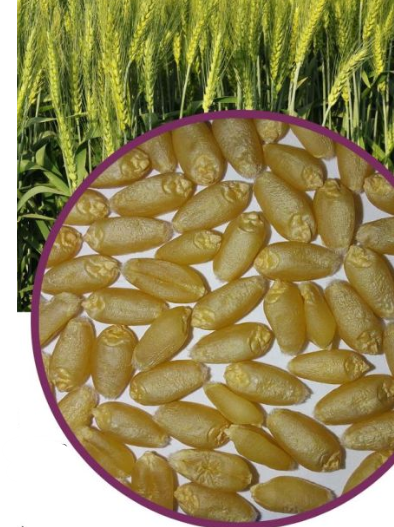
Released for Madhya Pradesh and Delhi NCR, Biofortified wheat variety with a high level of protein content (12.6%).
Benefit/utility: Average yield 65.91 q/ha, Recommended for early sown irrigated conditions, Resistant to all three rusts, Higher yielding than HD 3086 (by 24%), DBW 187 (by 7 %), WH 1270 (by 23%) and DBW 303 (by 24%), High level of karnal bunt resistance (3.3%) than other varieties, high hardness index (80.8) & Thousand Grain Weight: 47 g
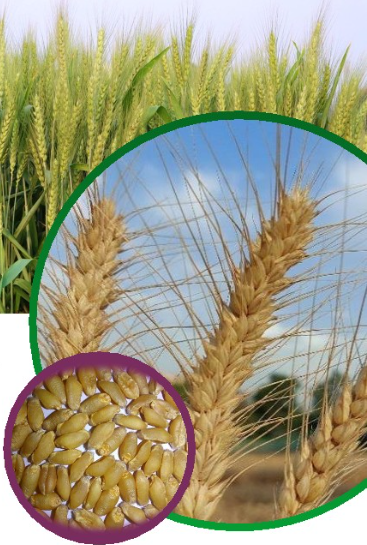
PPVFRA registered wheat variety
Average Yield: 59.7 q/ha
Potential yield: 73.4 q/ha
Plant Height: 98 cm
Lodging tolerant
Highly resistant to yellow, brown and black rust
Very high tillering variety
Higher yielding than 2968 (/by 15%), HD 3086 (by 10 %)and other popular varieties.
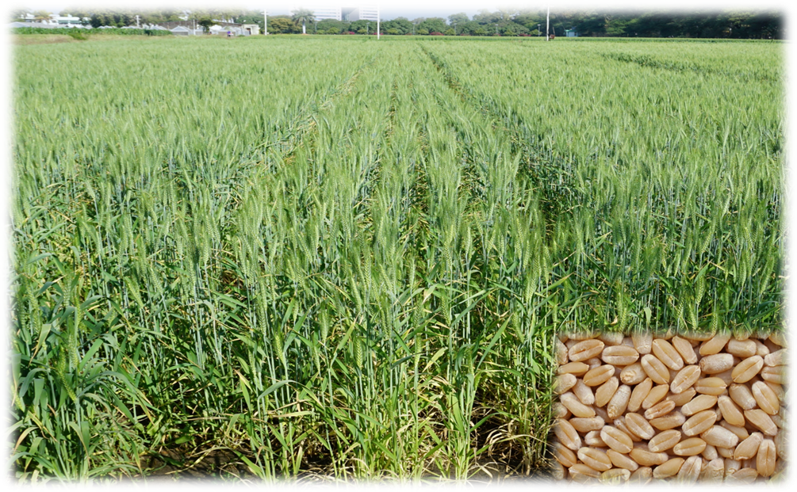
HI 1655 is a sharbati variety having an excellent quality with high hardness index (89.2), high hectoliter weight (80.4 kg/hl), excellent chapati quality (8.4), biscuit spread factor (7.0) and sedimentation value (42.6 ml)
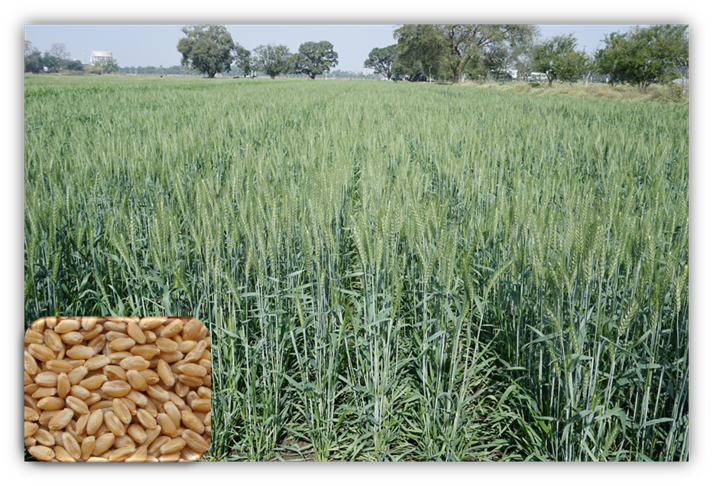
It is a good quality bread wheat genotype with excellent chapati quality (7.5), bread quality (7.6), biscuit spread factor (10.6) and high sedimentation value (52.7 ml).
• Resistant to: Blast disease, yellow and brown rusts
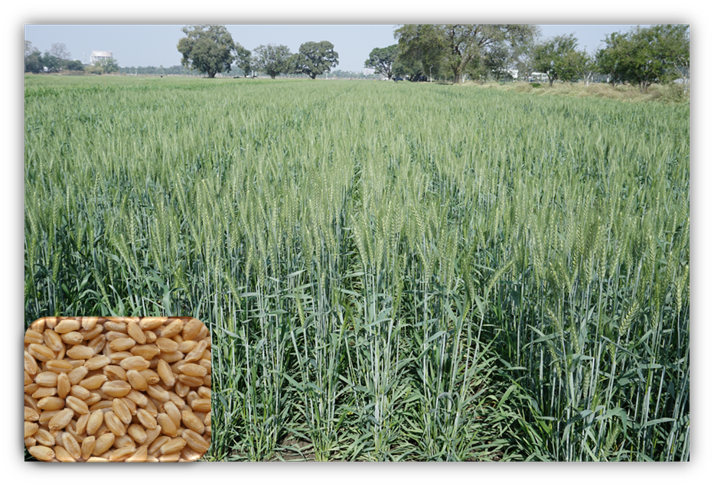
It is a good quality bread wheat genotype with excellent chapati quality (7.3), biscuit spread factor (8.4) and high sedimentation value (57.7 ml).
• Resistant to: Blast disease
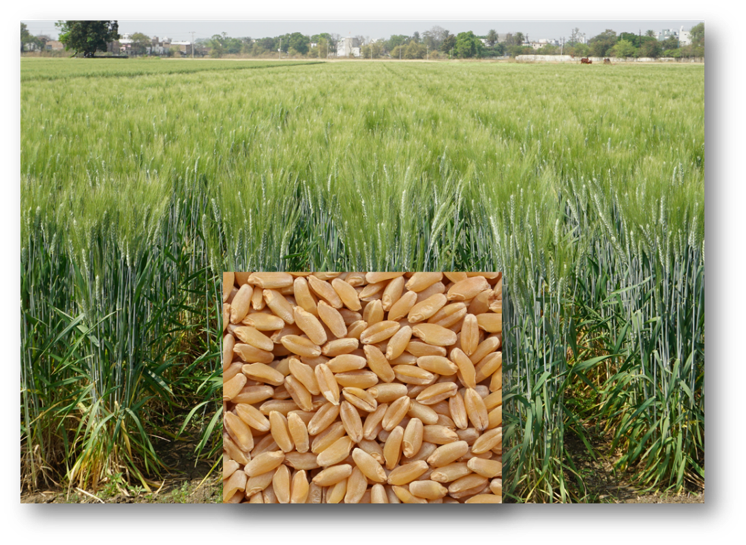
protein content (11.3%), higher yellow pigment content (7.4 ppmiron content (~38.6 ppm), zinc content (~38.8 ppm) with an overall pasta acceptability (6.5).

It is a bio-fortified durum wheat variety with yellow pigment content (7.0 ppm), zinc content (~40.9 ppm) with an overall pasta acceptability (6.6).
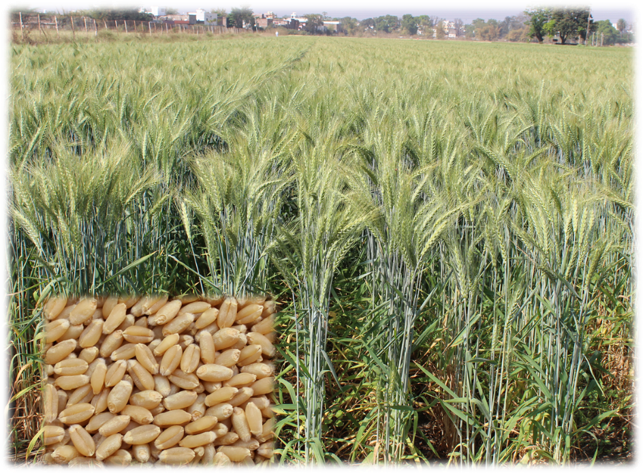
It is a quality wheat variety with excellent chapati quality (7.9), biscuit quality (7.5), test weight (82.3 kg/hl), grain hardness index (79.4)
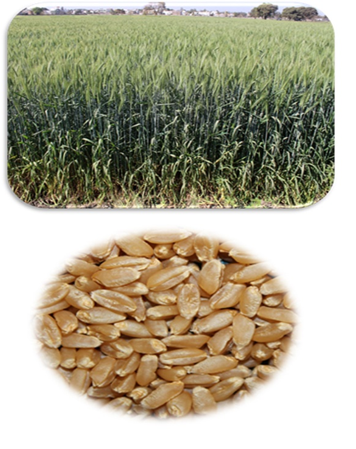
Tolerant- Early heat tolerance Suitable : Chapati and Biscuit Protein (%): ~12.0% Sedimentation value (ml): 58 Hectoliter weight (kg/ha): ~80 Yellow pigment – >6 ppm
• Resistant to: Stripe & leaf rust, loose & ?ag smut, leaf, FHB and Karnal bunt
Tolerant- Early heat tolerance Suitable : Chapati, Bread, Biscuit Protein (%): ~13.0% Sedimentation value (ml): 55 Hectoliter weight (kg/ha): ~80 Zn : 35.0 ppm
• Resistant to: Stem & leaf rust, flag smut, leaf blight, root rot and Karnal bunt
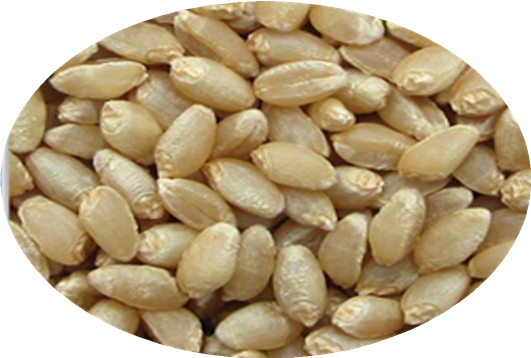
Recommended for Late Sown, Irrigated Conditions of Central Zone Madhya Pradesh, Gujarat, Chhattisgarh, Rajasthan (Kota and Udaipur divisions) and U.P. (Jhansi division)
High Yielding Rust Resistant Variety and Excellent End Product Quality
• High Grain hardness index with good Chapati and Biscuit making quality
• Resistant to Stem and leaf rusts
• Resistant to Leaf blight, Karnal bunt, Fusarium head blight, Flag smut, Foot rot and Loose smut
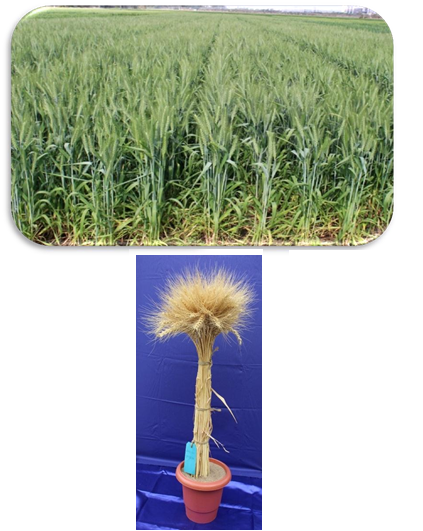
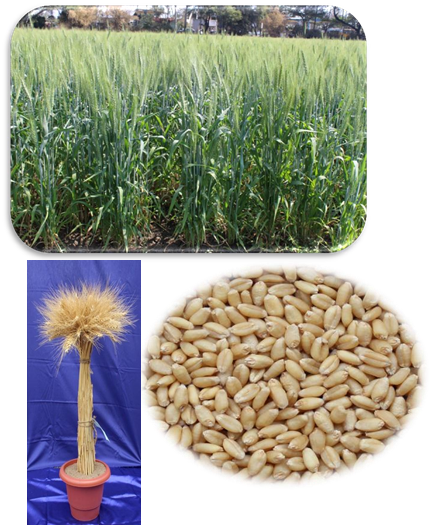
Recommended for Late Sown, Irrigated Conditions of Peninsular Zone (Maharashtra, Karnataka & Plains of Tamil Nadu)
High Yielding Bio-fortified, Rust Resistant Variety and Excellent End Product Quality
•Good Chapati and Biscuit making quality
•Resistant to Stem and leaf rusts
•Resistant to Leaf blight, Karnal bunt, Fusarium head blight, Flag smut, Foot rot and Loose smut
•Good Protein quality (Glu score : 8/10)
Recommended for Timely Sown, Restricted Irrigated Conditions of North Western Plains Zone
High Yielding Rust Resistant Variety and Excellent End Product Quality
•Good Chapati and Biscuit making quality
•Resistant to Stripe and leaf rusts
•Resistant to Leaf blight, Karnal bunt, Fusarium
•head blight, Flag smut and Loose smut
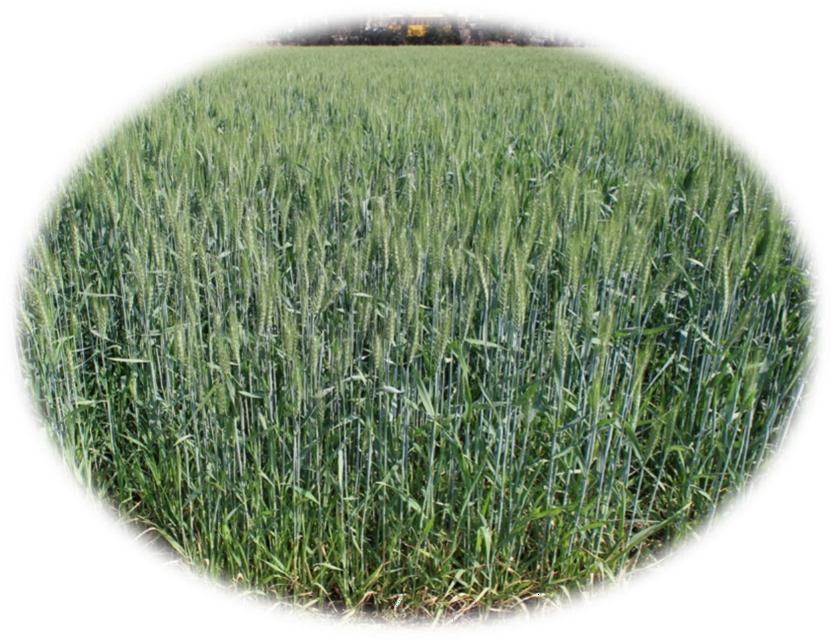
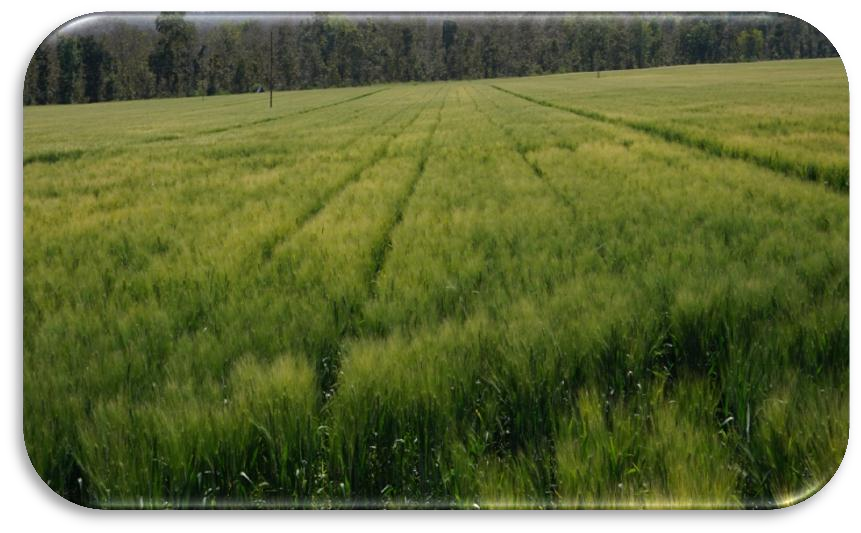
Recommended for Timely Sown, Irrigated Conditions of Central India Madhya Pradesh, Gujarat, Chhattisgarh, Rajasthan (Kota and Udaipur divisions) and U.P. (Jhansi division)
High Yielding Biofortified Variety and Excellent End Product Quality
• Resistant to stem and leaf rusts
• Resistant to Karnal bunt, foot rot, flag smut and loose smut
• High pasta acceptability with 7.5 hedonic score
HD 3226 is released for timely sown irrigated conditions of NWPZ of India. The variety has demonstrated its yield and disease resistance superiority over many established wheat varieties like HD 2967, DBW 88 WH 1105 and DPW 621-50 NWPZ by 3.1 to 9.0 per cent during its testing under All India Coordinated yield trials. Higher protein content in the grains of the HD 3226 by 0.5-1.0 percent value over the protein content of the other variety can significantly contribute to nutritional security.
The average yield(t/ha) of this variety is 57.5 q/ha and the potential yield is 79.6 q/ha. This variety matures in 142 days.
This variety is resistant to multiple diseases. Resistant against all three rusts (Stripe, Leaf, Black), Karnal bunt, Powdery mildew, Flag smut and Foot rot. Grain of this variety contains higher protein content (up to 13 %), highest wet gluten content (30.85 %), dry gluten content (10.10 %), and perfect Glu-1 Score (10) and therefore very suitable for both bread and chapatti making. This variety is highly suitable for early sowing under zero tillage condition and therefore can provide a strong base for yield consolidation with minimum foot print on environment.
NWPZ comprising of Punjab, Haryana, Delhi, Rajasthan (Except Kota and Udaipur Divisions), Western UP (Except Jhansi Division), Parts of j&K (Kathua district), parts of HP (Una district & Paonta Valley) and Uttrakhand (Tarai region)
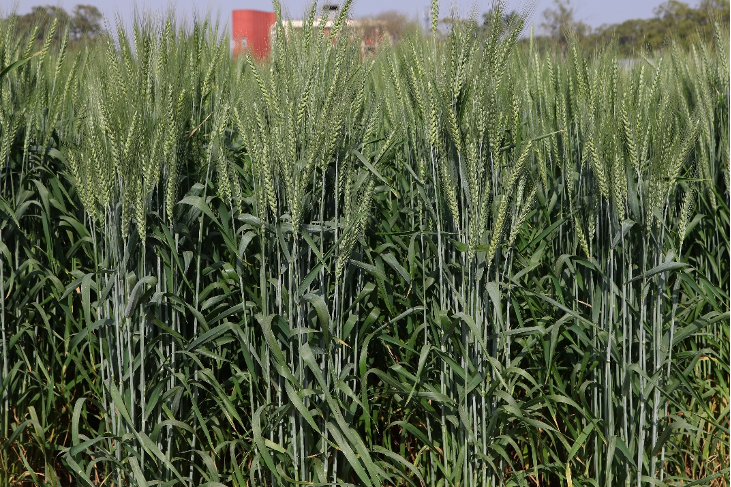
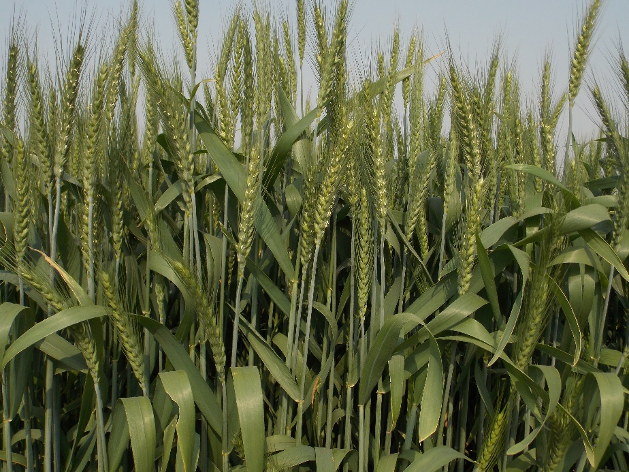
HD 3249 is recommended for timely sown irrigated condition of North Eastern Plain Zone (NEPZ). This variety is highly resistant against Wheat Blast, Leaf and Stripe rust. This variety is good for chapati making.
The average yield(t/ha) of this variety is 57.5 q/ha and the potential yield is 65.7 q/ha. This variety matures in 122 days. This variety is resistant to Wheat blast, Karnal bunt, leaf blight and powdery mildew resistant. This variety has the best HMW sub-units’ combination for bread making with Glu-1 score, 8/10 and good chapati making quality.
HD 3271 is recommended for very late sown irrigated condition of North Western Plain Zone (NWPZ) and North Eastern Plain Zone (NEPZ). This variety has given higher yield ranging from 2.5 to 13.8 % against the checks in national level. HD 3271 is most amenable to timely sown, late and very late sowing conditions as it has shown maximum gains in yield in timely sown and late sown conditions. This variety is suitable for bread making.
The average yield(t/ha) of this variety is 36.6 q/ha (NWPZ) & 28.1 q/ha (NEPZ) and the potential yield is 59.2 q/ha (NWPZ) & 33.1 q/ha (NEPZ). This variety matures in 122 days (NWPZ) & 98 days (NEPZ). This variety is resistant against leaf and stripe rust. This variety has the best HMW sub-units’ combination for bread making with Glu-1 score, 8/10. This variety gives higher yield from normal to very late sown condition, showing its wider adaptability. Its disease resistance ability gives yield stability and environment protection.
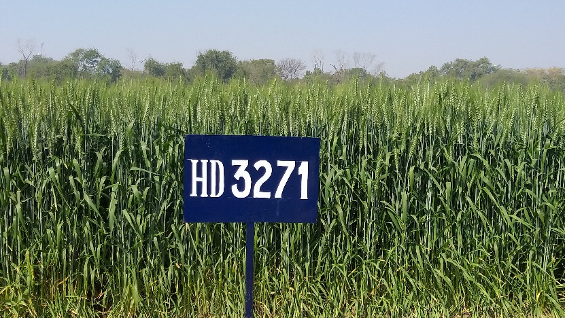
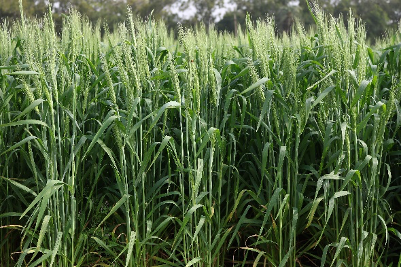
HD 3298 is recommended for very late sown irrigated condition of NWPZ. HD 3298 is a Bio-fortified wheat variety with high Fe content (43.1 %) and good level protein content (12.12 %). HD 3298 has 6 to 26 % higher yield over popular wheat varieties WR 544, DBW 14, DBW 71under very late sown condition. This variety exhibited multiple disease resistance and tolerance to heat stress. HD 3298 is likely to be durable in resistance against all five races of stripe rust because of combinations of APR and seedling resistance. This variety is good for chapati making.
The average yield(t/ha) of this variety is 39.0 q/ha and the potential yield is 47.4 q/ha. This variety matures in 104 days. This variety is resistant against stripe rust, leaf rust, karnal bunt, powdery mildew, foliar head blight and flag smut. This is a Bio-fortified wheat variety with high Fe content (43.1 %) and good level protein content (12.12 %). This variety gives higher yield from normal to very late sown condition, showing its wider adaptability.
HD 3293 is recommended for timely sown restricted irrigated condition of NEPZ. This variety is highly resistant again Wheat Blast, Leaf and Stripe rust. HD 3293 showed a yield superiority of 26.61% over blast resistant recently released variety DBW252. This variety is carrying APR gene and displayed resistance to leaf rust under natural condition. It is also tolerant to heat stress.
The average yield(t/ha) of this variety is 38.8 q/ha. This variety matures in 129 days. This variety is resistant against wheat blast, karnal bunt, leaf blight and powdery mildew. This variety has the best HMW sub-units’ combination for bread making with Glu-1 score, 8/10. This variety is wide cultivation in NEPZ will be necessary to check the spread of this disease. Its higher yield along with tolerance to heat stress will provide more income to the farmers.
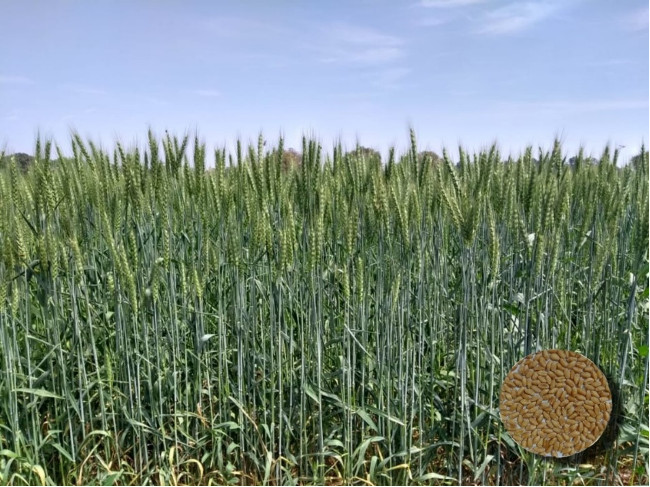
This is the first ever variety bred for conservation agriculture (CA), Suited for early sowing (mid-October) and released for NCR region. The average yield(t/ha) of this variety is 6.28 t/ha and Matures in 155 days with average plant height of 110 cm. This is best suited in the areas where early maturing rice varieties like Pusa Basmati 1509 and Pusa Basmati 1121 are being grown widely.
This variety is highly resistant to Brown rust and lower incident of Karnal bunt. Also, Resistant to high temperature at Seedling stage. It has pointed dark green leaves with very long ear head and long grain.
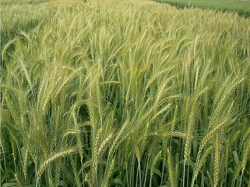
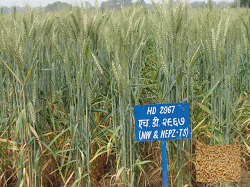
This is a widely accepted variety, carries diversified genes other than 1B/1R. The recommended Area for this variety includes Punjab, Haryana, Delhi, Rajasthan (except Udaipur & Kota Div) U.P. Jammu & Kathua Districts of J&K, Paonta Valley and Una districts of HP and Tarai region of Uttarakhand, Bihar, Jharkhand, Orissa, West Benagal, Assam and plains of NE States.
This variety possesses very high adult plant resistance against most prevalent leaf rust disease as well as of 78S84 and 46S119, two most virulent races of yellow rust disease. It has also better degree of resistance against leaf blight. It matures in 129 days (NEPZ) & 143 days (NWPZ). Its average yield is NWPZ 5.0 t/ha and NEPZ 4.4 t/ha.
The recommended Area for this variety includes Punjab, Haryana, Delhi, Rajasthan (except Udaipur & Kota Div) West UP ( except Jhansi Div), Jammu & kathua Districts of J&K, Paonta Valley and Una districts of HP and Tarai region of Uttarakhand.
The production conditions are late sown irrigated and average yield is 4.3 t/ha. It matures in 121 days and resistant to Yellow, Brown and Stem rusts.
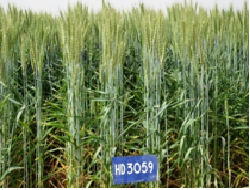
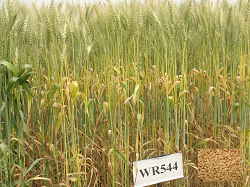
The recommended area for this variety includes NCR Region.
The production conditions are late sown irrigated and average yield is 3.7 t/ha. It matures in 118 days .It is highly resistant to Yellow, Brown and Stem rusts.
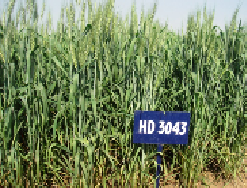
The recommended area for this variety includes Punjab, Haryana, Delhi, Rajasthan (except Udaipur & Kota Div) West UP ( except Jhansi Div), Jammu & kathua Districts of J&K, Paonta Valley and Una districts of HP and Tarai region of Uttarakhand.
The production conditions are restricted Irrigation and average yield is 4.3 t/ha. It matures in 140-145 days. It is Resistant to Yellow and Brown rusts.
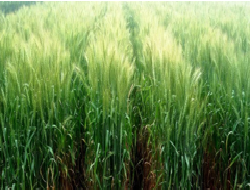
The recommended area for this variety includes NCR-Delhi region.
The production conditions are late sown irrigated and under conservation agriculture (CA) environment. The average yield is 4.7 t/ha. It is Resistant to Leaf, Stripe and Stem rusts.
The recommended area for this variety includes Punjab, Haryana, Delhi, Rajasthan (except Udaipur & Kota Div) West UP area ( except Jhansi Div), Jammu & kathua Districts of J&K, Paonta Valley and Una districts of HP and Tarai region of Uttarakhand.
The production conditions are timely sown irrigated and average yield is 5.4 t/ha. It matures in 145 days. It is Resistant to Yellow and Brown rust.
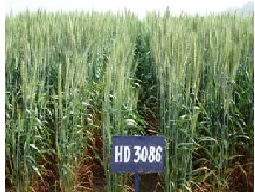
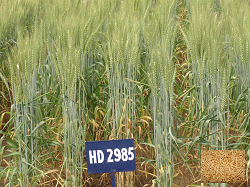
The recommended area for this variety includes Eastern UP, Bihar, Jharkhand, Orissa, Sikkim, West Bengal, Assam and plains of NE States.
The production conditions are late sown irrigated. The average yield is 3.5-4.0 t/ha. It Matures in 105-110 days and is resistant to Brown rust.
The recommended area for this variety includes Eastern UP, Bihar, Jharkhand, Orissa, Sikkim, West Bengal, Assam and plains of NE States.
The production conditions are late sown irrigated. The average yield is 4.2 t/ha. It is resistant to Leaf and Stripe rust.
.jpg)
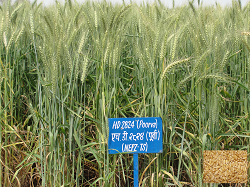
The recommended area for this variety includes Eastern UP, Bihar, Jharkhand, Orissa, Sikkim, West Bengal, Assam and plains of NE States.
The production conditions are timely sown irrigated. The average yield is 4.6 t/ha. It Matures in 130-135 days. It is Resistant to Leaf and Stripe rust.
The recommended area for this variety includes Eastern UP, Bihar, Jharkhand, Orissa, Sikkim, West Bengal, Assam and plains of NE states.
The production conditions are timely sown irrigated. The average yield is 4.1 t/ha. It matures in 110-115 days. It is resistant to Leaf and Stripe rusts, also tolerant to Leaf blight.

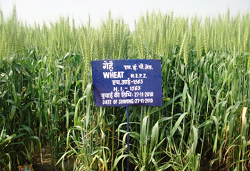
It is a good quality wheat genotype with good bread, chapatti & biscuit quality with good levels of micronutrients like iron, zinc and copper. The recommended area for this variety includes Eastern UP, Bihar, Jharkhand, Orissa, Sikkim, West Bengal, Assam and plains of NE states.
The production conditions are late sown irrigated. The average yield is 4.5 t/ha. It matures in 110-115 days. It is highly resistant to Stripe, Stem & Leaf rusts. It has good levels of resistance to leaf blight, powdery mildew and foot rot.
The recommended area for this variety includes Eastern UP, Bihar, Jharkhand, Orissa, Sikkim, West Bengal, Assam and plains of NE states
The production conditions are timely sown rainfed. The average yield is 2.25 t/ha. It matures in 135-140 days and is highly resistant to Leaf and Stem rusts and moderate resistance to Stripe rust. It has high extraction (flour recovery) without disturbing the quality and micro nutrient contents.
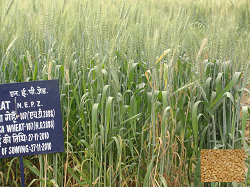
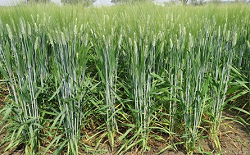
The recommended area for this variety includes M.P., Chhattisgarh, Gujarat, Kota and Udaipur Division of Rajasthan and Jhansi Div Of U.P.
The production conditions are timely sown irrigated. The average yield is 5.3 t/ha. It matures in 120 days. It is highly resistant to Leaf and stem rusts.
The recommended area for this variety includes M.P., Chhattisgarh, Gujarat, Kota and Udaipur Division of Rajasthan and Jhansi Div Of U.P.
The production conditions are rainfed & early sown restricted irrigation.The average yield is 2.5-3.0 t/ha. It matures in 20-125 days. It is resistant to Leaf and Stem rusts.
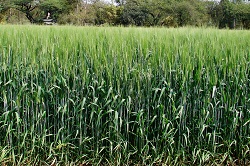
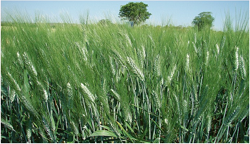
The recommended area for this variety includes M.P., Chhattisgarh, Gujarat, Kota and Udaipur Division of Rajasthan and Jhansi Div Of U.P.
The production conditions are timely sown irrigated. The average yield is 5.23 t/ha. It matures in 120 days and resistant to Leaf and Stem rust.
The recommended area for this variety includes M.P., Chhattisgarh, Gujarat, Kota and Udaipur Division of Rajasthan and Jhansi Div Of U.P.
The production conditions are timely sown irrigated. The average yield is 5.0-5.5 t/ha. It matures in 110-115 days. It is highky Resistant to Leaf and Stem rusts.
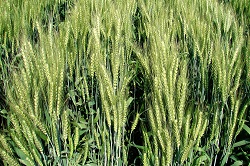
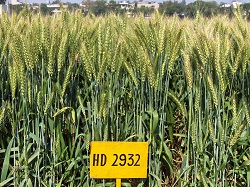
The recommended area for this variety includes M.P., Chhattisgarh, Gujarat, Kota and Udaipur Division of Rajasthan and Jhansi Div Of U.P., Maharashtra, Karnataka, A.P. Goa and plains of Tamilnadu.
The production conditions are late sown irrigated. The average yield is 4.5 t/ha. It matures in 110-115 days. It is resistant to Leaf and Stem rusts.
.jpg)
The recommended area for this variety includes Maharashtra, Karnataka, Andhra Pradesh, Goa and Plains of Tamil Nadu.
“Production conditions Irrigated, late shown. The average yield is 4.21 t/ha. It matures in 101 days. It is resistant to Leaf and Stem rust.
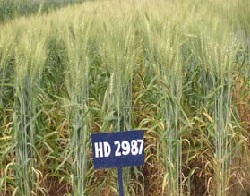
The recommended area for this variety includes Maharashtra, Karnataka, Andhra Pradesh, Goa and Plains of Tamil Nadu.
The production conditions are rainfed & timely shown restricted irrigation. The average yield(t/ha) is Rainfed (2.2). Restricted Irrigation(3.2). It matures in 109 days.It is highly resistant to Leaf and stem rusts.
The recommended area for this variety includes Maharashtra, Karnataka, Andhra Pradesh, Goa and Plains of Tamil Nadu.
The production conditions are timely sown irrigated. The average yield is 5.5 t/ha. It matures in 125 days. It is highly resistant to Leaf and Stem rusts.
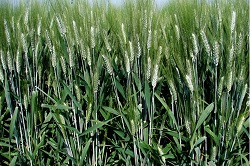
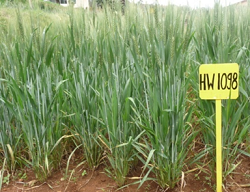
The recommended area for this variety includes Dicoccum growing regions of India.
The production conditions are timely sown irrigated. The average yield is 4.55 t/ha. It is resistant to Leaf, Stripe and Stem rusts.
The recommended area for this variety includes Western Himalayan regions of J&K ( except Jammu & Kathua districts),H.P.( except Una & Paonta valley), Uttarakhand (except Tarai area), Sikkim and hills of West Bengal and North East States.
The production conditions are timely sown rainfed & irrigated.The average yield is 3.6 t/ha(Rainfed condition) and 5.2 t/ha(Irrigated condition). It matures in 155 days. It is resistant to Leaf and Stripe rusts.
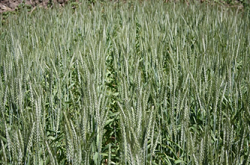
The recommended area for this variety includes North Eastern Plains Zone (NEPZ) comprising of East of UP, Bihar, Jharkhand, West Bengal (excluding hills), Orissa, Assam and plains of N. E. States.
Plant height: 94 cm (range 67-115)
Maturity range: Seeding to flowering: 75 days (range 56-97)
Seed to Seed: 112 (range 94-135)
Average Yield: 4.171 t/ha
Production Conditions: Irrigated Late Sown Conditions
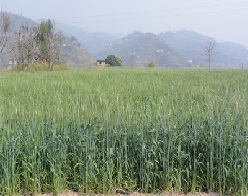
 Phone
Phone


